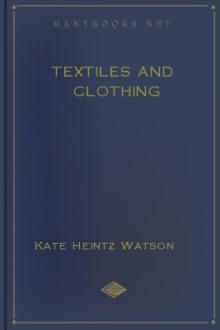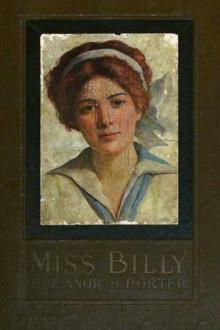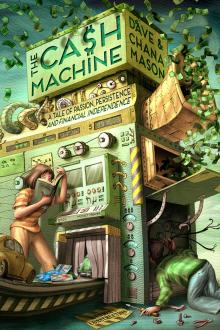Genre Romance. Page - 9

the electric dynamo and moves her fingers only to keep the threads in order. If she wishes to weave a pattern in the cloth, no longer does she pick up threads of warp now here, now there, according to the designs. It is all worked out for her on the loom. Each thread with almost human intelligence settles automatically into its appointed place, and the weaver is only a machine tender.
[Illustration: FLY SHUTTLE HAND LOOM.
The Pulling of the Reed Automatically Throws the Shuttle Back and Forth and Works the Harness, Making a Shed at the Proper Time.]
[Sidenote: Primitive Fabrics]
No textiles of primitive people were ever woven in "pieces" or "bolts" of yards and yards in length to be cut into garments. The cloth was made of the size and shape to serve the particular purpose for which it was designed. The mat, robe, or blanket had tribal outlines and proportions and was made according to the materials and the use of common forms that prevailed among the tribes. The designs were alway

of him was as near murder as Wearycould come. Glory had been belabored with worse things than hatsduring his eventful career; he laid back his ears, shut his eyes tightand took it meekly.
There came a gasping gurgle from the hammock, and Weary's hand stoppedin mid-air. The girl's head was burrowed in a pillow and her slipperstapped the floor while she laughed and laughed.
Weary delivered a parting whack, put on his hat and looked at heruncertainly; grinned sheepishly when the humor of the thing came to himslowly, and finally sat down upon the porch steps and laughed with her.
"Oh, gee! It was too funny," gasped the girl, sitting up and wipingher eyes.
Weary gasped also, though it was a small matter--a common little wordof three letters. In all the messages sent him by the schoolma'am, itwas the precise, school-grammar wording of them which had irritated himmost and impressed him insensibly with the belief that she was too primto be quite human. The Happy Family had felt all along

, but darkly hinted at the little rift within the lute, and somehow after that night the glamour seemed to have departed from this honeymoon pair, and the fair seeming was regarded with suspicion.
As regards the matter of distance, it took an easy two minutes to cover the space between the front doors of the two houses, and there seemed an endless number of reasons why the members of the different families should fly round to consult each other a dozen times a day. Darsie and Lavender, Vi and plain Hannah attended the same High School; the Garnett boys and John Vernon the same Royal Institute, but the fact that they walked to and from school together, and spent the intervening hours in the same class-rooms, by no means mitigated the necessity of meeting again during luncheon and tea hours. In holiday times the necessity naturally increased, and bells pealed incessantly in response to tugs from youthful hands.
Then came the time of the great servants' strike. That bell was a perfect nuisance; rin

--just enough to have made Connery believe, at first, that probably he had seen the man meeting some passenger at the station.
"You are--" Connery ventured more casually.
"In private employ; yes, sir," the man cut off quickly. Then Connery knew him; it was when Gabriel Warden traveled on Connery's train that the conductor had seen this chauffeur; this was Patrick Corboy, who had driven Warden the night he was killed. But Connery, having won his point, knew better than to show it. "Waiting for a receipt from me?" he asked as if he had abandoned his curiosity.
The chauffeur nodded. Connery took a sheet of paper, wrote on it, sealed it in an envelope and handed it over; the chauffeur hastened back to his car and drove off. Connery, order in hand, stood at the door watching the car depart. He whistled softly to himself. Evidently his passenger was to be one of the great men in Eastern finance who had been brought West by Warden's death. As the car disappeared, Connery gazed off to the Sound.

e than any other of the owner's treasures. It was, curiously enough, to this little heap of literature that Wid Gardner presently turned.
Forgetful of the hour and of his waiting cows, he sat down, a copy in his hands, his face taking on a new sort of light as he read. At times, as lone men will, he broke out into audible soliloquy. Now and again his hand slapped his knee, his eye kindled, he grinned. The pages were ill-printed, showing many paragraphs, apparently of advertising nature, in fine type, sometimes marked with display lines.
Wid turned page after page, grunting as he did so, until at last he tossed the magazine upon the top of the box and so went about his evening chores. Thus the title of the publication was left showing to any observer. The headline was done in large black letters, advising all who might have read that this was a copy of the magazine known as Hearts Aflame.
Curiously enough, on the front page the headline of a certain advertisement showed plainly. I

ey wouldn't," she objected. "You don'tknow how noisy I am."
The lawyer stirred restlessly and pondered.
"But, surely, my dear, isn't there some relative, somewhere?" hedemanded. "How about your mother's people?"
Billy shook her head. Her eyes filled again with tears.
There was only Aunt Ella, ever, that I knew anything about. Sheand mother were the only children there were, and mother died whenI was a year old, you know."
"But your father's people?"
"It's even worse there. He was an only child and an orphan whenmother married him. He died when I was but six months old. Afterthat there was only mother and Aunt Ella, then Aunt Ella alone; andnow--no one."
"And you know nothing of your father's people?"
"Nothing; that is--almost nothing."
"Then there is some one?"
Billy smiled. A deeper pink showed in her cheeks.
"Why, there's one--a man but he isn't really father's people,anyway. But I--I have been tempted to write to him."
"Who is he?"
"The one I'm named



